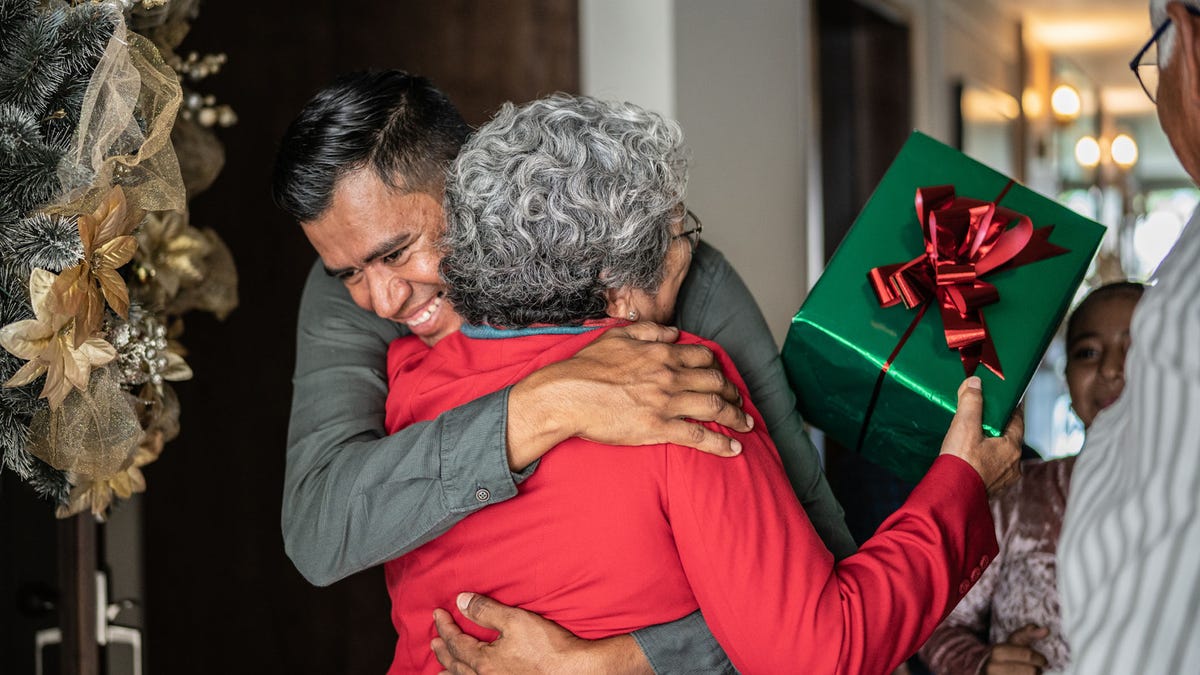The holiday season can be a stressful time for everyone — but particularly for those living with dementia, as well as their caregivers and loved ones.
Statistics show that an estimated 6.7 million people over 65 in the U.S. have Alzheimer’s disease, the most common type of dementia.
Meanwhile, nearly 90% of U.S. adults report experiencing stress during the holiday season, according to the American Psychological Association.
15 HOLIDAY GIFTS FOR DEMENTIA PATIENTS AND CAREGIVERS: ‘COGNITIVELY APPROPRIATE’
“The holiday season can be confusing and overwhelming for those living with dementia, as well as a stressful time for their family caregivers who care for them every day,” said Jessica Corona-Irwin, an Ohio-based registered nurse and certified dementia practitioner at Remo Health, a virtual dementia care company.

“One-on-one interactions can be easier than larger group conversations, as the individual feels included and valued,” one expert said. (iStock)
“One reason for this is that the holiday season often involves changes in daily routines,” she told Fox News Digital. “People living with dementia often need to maintain a daily routine. This consistency can help them feel more secure and reduce anxiety.”
Several experts shared the following tips to help dementia patients, family members and caregivers enjoy a smooth, low-stress holiday.
DEMENTIA REPORT REVEALS ‘SHOCKING’ SIGNS AT AGE 60 THAT YOU’LL DEVELOP THE DISEASE BY AGE 80
1. Prepare family and friends in advance
Kate Granigan, Aging Life Care Association board president in Boston, Massachusetts, recommends explaining any changes in the loved one’s behavior, memory or communication prior to holiday gatherings, especially if others are unfamiliar with dementia.
“A little preparation and understanding helps create a more positive atmosphere.”
“Encourage visitors to be patient, avoid correcting or interrupting, and give your loved one time to express themselves,” she suggested to Fox News Digital.
“A little preparation and understanding helps create a more positive atmosphere.”
2. Stay as consistent as possible
It’s important to try to keep meal times, bedtimes and other daily activities at approximately the same times during the holiday season, according to Corona-Irwin.
“If changes are necessary, make them gradually and communicate them clearly,” she advised.

One expert recommended engaging your loved one in familiar traditions, such as stirring cookie dough or singing familiar songs, to “spark joy and a sense of inclusion.” (iStock)
“For example, if you’re planning a holiday meal at a different time, one tip is to start shifting the usual mealtime a few days in advance to help your loved one adjust smoothly.”
3. Simplify the environment
It’s best to keep the dementia patient’s surroundings as simple as possible, according to Dr. Tina Sadarangani, an NYU professor, board-certified geriatric nurse practitioner, and founder of the CareMobi app and The Enlightened Caregiver.
“Stick to familiar and nostalgic decorations, avoiding flashing lights or loud sounds that might be overstimulating,” she suggested.
‘HIDDEN’ FAT COULD PREDICT ALZHEIMER’S DISEASE UP TO 20 YEARS BEFORE SYMPTOMS, RESEARCH FINDS
The theme of simplicity should extend to activities, said Corona-Irwin.
“Prioritize activities that are simple and enjoyable, such as listening to favorite holiday music, looking at old family photos, or engaging in gentle, sensory activities,” she suggested.
“These can be very comforting and bring joy without causing stress.”
4. Communicate clearly and patiently
For many individuals with dementia, it can be challenging to follow conversations, especially when the environment is very busy and noisy, according to Dr. Michele Nealon, president of The Chicago School, a non-profit graduate school focused on psychology and related behavioral sciences.

When selecting gifts for someone with dementia, experts suggest considering their comfort and enjoyment. (iStock)
“Use straightforward language, make eye contact and give your loved one extra time to respond or even not respond,” California-based Nealon advised.
“One-on-one interactions can be easier than larger group conversations, as the individual feels included and valued.”
5. Embrace familiar traditions
Sadarangani also recommends engaging your loved one in familiar traditions, such as stirring cookie dough or singing familiar songs, to “spark joy and a sense of inclusion.”
“Sensory activities like listening to calming holiday music, touching soft decorations or enjoying the scents of the season can also evoke positive feelings without overwhelming them,” she added.
“Accept that holidays don’t have to be perfect to be meaningful.”
Focus on what they can do rather than their limitations, Sadarangani suggested.
“Involve them in simple, meaningful tasks like folding napkins or flipping through photo albums,” she said. “Planning short, flexible activities can prevent fatigue.”
6. Provide a calm space
The holidays tend to be noisier and busier than usual, which can overwhelm someone with dementia, Nealon noted.

“If you can, have a quiet space or room where they can retreat for relaxation if that is needed,” an expert suggested. (iStock)
“If you can, have a quiet space or room where they can retreat for relaxation if that is needed,” she suggested to Fox News Digital.
“Set up the room to be as soothing as possible, with soft lighting, familiar objects and gentle music to create a sense of calmness.”
7. Prioritize self-care
For caregivers, Sadarangani emphasized the importance of setting realistic expectations and prioritizing self-care.
“Accept that holidays don’t have to be perfect to be meaningful and embrace moments of connection, however small they may be,” she advised.
DEMENTIA RISK COULD BE LINKED TO WALKING SPEED, STUDY SUGGESTS
To help lighten the load during the busy season, caregivers should enlist help when they need it.
“Caregiving can be physically and emotionally exhausting, and even brief moments of rest can go a long way toward reducing stress and avoiding burnout,” Nealon said.

“Ask for help, assign responsibilities to family members and get the family involved with cooking, decorating and cleaning up.”
“Caregivers cannot do it all, and certainly not alone.”
8. Choose thoughtful gifts
When selecting gifts for someone with dementia, Nealon suggests considering their comfort and enjoyment.
“Items like simple puzzles or a warm sensory blanket can provide much-needed comfort and joy,” she suggested.
9. Swap the TV for music
For some people living with dementia, watching television can be difficult, as they may struggle with storylines, according to Hannah Karim, care expert lead for the online care finder Lottie.
“It’s important to validate their feelings and provide reassurance.”
“This Christmas, swap out the TV for the radio — or a specially curated dementia-friendly playlist — as it can be easier to follow,” suggested Karim, who is based in the U.K.
“Music has many health and well-being benefits, especially for those with dementia,” she went on. “Research has found that music can help reduce anxiety and spark joy while reminiscing over fond memories of Christmas celebrations from the past.”
CLICK HERE TO SIGN UP FOR OUR HEALTH NEWSLETTER
Listening to the family’s favorite Christmas songs during the holidays can also help create shared memories for everyone, Karim added.
10. Validate their feelings
Emotional support is just as important as physical care, Corwin-Irwin noted.
“Your loved one might feel sad, anxious or overwhelmed during the holidays,” she said. “It’s important to validate their feelings and provide reassurance.”

“Stick to familiar and nostalgic decorations, avoiding flashing lights or loud sounds that might be overstimulating,” a geriatric nurse practitioner suggested. (iStock)
You can do this by letting them know it’s OK to feel the way they do and that you are there to support them, according to Corwin-Irwin.
“Simple gestures like holding their hand, giving them a hug or sitting quietly with them can be incredibly comforting,” she added.
For more Health articles, visit www.foxnews.com/health
Added Sadarangani, “By focusing on creating a calm, inclusive environment and cherishing meaningful moments, you can ensure that the holidays remain a source of joy and connection for your loved one and your family.”
